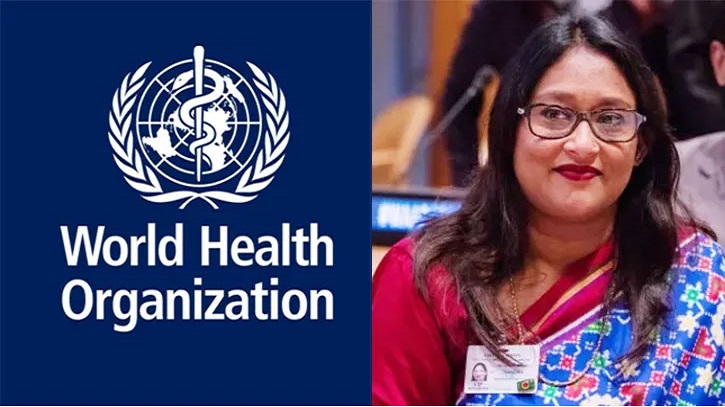Bangladesh comes to this leadership position for the first time
The whole region will benefit now more than ever
One-size-fits-all policies cannot help address public health challenges in a diverse region like Southeast Asia—this is what Saima Wazed said during her election campaign.
“I will champion an approach that focuses on local solutions for local realities,” she said in the election manifesto.
With her achieving the office of regional director of WHO’s Southeast Asia region, known as Searo, on Wednesday, analysts believe she will address the public health challenges of the 11 member states by attaining equitable healthcare that is innovative and profound in local knowledge.
“This is the first time Bangladesh has come to this leadership position. It’s a great achievement for us and an opportunity for the region as well. It’s because Bangladesh has the expertise to deal with a range of problems when it comes to public health. The whole region will benefit now more than ever,” Prof Mahmudur Rahman, an infectious disease epidemiologist, told Dhaka Tribune.
Saima Wazed is the daughter of Prime Minister Sheikh Hasina. But she is globally famed for her role as a mental health expert, particularly in autism. She is an advisor to the WHO’s director-general for mental health.
She won the election with eight votes. Her rival, Dr Shambhu Prasad Acharya of Nepal, a WHO official, obtained two votes.
After winning the election, Saima Wazed, in an instant reaction on Wednesday, said she was looking forward “to building a healthier Southeast Asia”.
She paid tribute to the outgoing regional director, Dr Poonam Khetrapal Singh, for her decade of service to public health in the region.
She also paid a special tribute to her rival candidate, Dr Shambhu Prasad Acharya of Nepal, and said he had been an “invaluable asset” to the WHO, hoping that Southeast Asia would continue to benefit from his knowledge and experience.
Her vision for the region is clear.
Firstly, strengthening the ability of member states and WHO in addressing health gaps in the context of current realities and foreseen and unforeseen challenges.
The second is to empower marginalized and vulnerable groups to ensure that they are not further disenfranchised.
The third is to enable countries in the WHO Southeast Asia region to implement equitable health by improving or creating effective and innovative local solutions.
“Our diverse regional reality underpins my belief that we must move away from one-size-fits-all policies at both national and sub-national levels. I will champion an approach that focuses on local solutions for local realities. A ground-up approach creates effective and durable solutions when it draws on the expertise of member states’ understanding of their own communities,” she had said.
Bangladesh, Bhutan, the Democratic People’s Republic of Korea (DPRK), India, Indonesia, the Maldives, Nepal, Sri Lanka, Thailand, and Timor-Leste took part in the voting in New Delhi on Wednesday, the third day of the 76th session of the WHO Regional Committee for South-East Asia. Myanmar, the other member, did not attend the meeting.
Her name will now be submitted for appointment by the 154th session of the WHO Executive Board, which will take place on January 22–27, 2024, in Geneva, Switzerland.
After that, she will take office on February 1 for a five-year term and be eligible for reappointment once.
With that, Saima Wazed will be the first Bangladeshi to hold the post created in 1948 as part of WHO’s regional divisions.
Saima Wazed has drawn the attention of the people of Bangladesh and the world, not just as the daughter of the prime minister and granddaughter of Bangabandhu Sheikh Mujibur Rahman.
She spearheaded the campaign for autism awareness in Bangladesh at a time when parents would hide their children with this neurodevelopmental disorder due to the social stigma attached to the developmental disability.
She is a licensed school psychologist in the US and a faculty member of the Adrian Dominican School of Education (ADSOE) at Barry University, US.
She led a South Asia regional meeting in Dhaka on autism in July 2011, bringing together regional and global experts and leaders, including then-president of the Indian National Congress Sonia Gandhi, former Sri Lankan first lady Shiranthi Rajapaksa, and Ilham Hussain, the wife of then-vice president of the Maldives Mohammed Waheed Hassan.
After that, Bangladesh’s National Advisory Committee on Autism and Neurodevelopmental Disorders and the Global Autism Public Health Initiative were established under her chairmanship.
“It is because of her that we could make a place for our children in society. It is hard to explain how grateful we are to her,” Sajida Rahman Danny, founder-president of Parents Forum for Differently Able, told Dhaka Tribune in September when Saima Wazed announced her candidacy.
It was because of Saima Wazed that WHO adopted several resolutions for the welfare of children with autism.
The WHO Searo in 2014 recognized her contribution with the WHO Excellence Award for Public Health, saying she had put autism on the WHO map.
In the citation note, the WHO said she had played a “path-breaking” role in addressing autism at the national, regional, and global levels to ensure there was a national policy and commitment for autistic children.
She was also made an advisor to the director general of WHO on mental health and autism.
“I come from a well-known political family that most are familiar with and incorrectly assume that I have always lived a life of privilege. Despite being born in Bangladesh as the granddaughter of the Father of the Nation, my earliest memories were that of growing up in India as a refugee,” she said on her personal website.
Bangabandhu was assassinated on August 15, 1975, along with most of his family members. Sheikh Hasina survived the attack as she was abroad at the time. But she could not come home until 1981.
Source: Dhaka Tribune.

